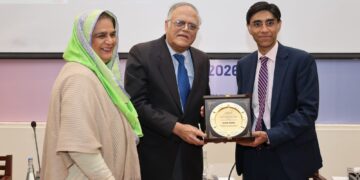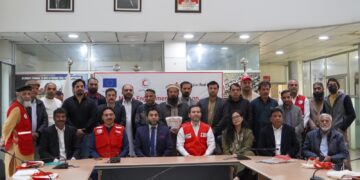KARACHI – World Diabetes day is a day to create awareness on diabetes. The Diabetic Association of Pakistan, Karachi organised recently a Scientific session at local hotel.
On this occasion Prof. Abdul Basit Secretary General, Diabetic Association of Pakistan (DAP) introduced the theme of the World Diabetes Day “Access to Diabetes Care” and this year’s campaign slogan “Know your risk of diabetes and your response”. He said Diabetes is a persistent and debilitating health condition, imposing significant financial burdens on both individuals and healthcare systems. In Pakistan, a staggering 33 million people currently live with diabetes, and projections indicate that this number could surge to 62 million by the year 2045.
To combat the growing diabetes challenge in Pakistan, it is imperative to implement effective measures for mitigating the risk of Type 2 diabetes.
Central to this initiative is the promotion of a nationwide screening program that utilizes the RAPID score, a scientifically validated tool designed to assess individual diabetes risk. by considering parameters such as age, waist circumference, and a positive family history of diabetes. With a score equal to or greater than 4 indicating an individual’s risk of developing diabetes.
It is crucial for all stakeholders to unite and take decisive action now. Through this collective effort, we can significantly advance our endeavors to address the diabetes challenge and enhance public health for everyone.
1st Speaker of the Scientific Session was Prof. Muhammad Yakoob Ahmedani, Prof. of Medicine, Baqai Medical University (BMU), Karachi. Who talked on the topic of “Diabetes and Ramadan”. He said fasting throughout the month of Ramadan is one of Islam’s five pillars for all healthy muslim adults and adolescents. People with diabetes must be careful while fasting for long hours. Managing diabetes during Ramadan involve a multidisciplinary approach. For safe fasting they must seek advice from healthcare provider regarding diet, exercise, insulin dosage and medication adjustments. While fasting diabetics must monitor their blood sugar levels regularly as they are at risk of hypoglycemia and hyperglycemia. Dehyration is a common and serious risk so maintain proper body fluids. Lemon water, fresh water and lassi are best. A spoonful of yogurt after sehri meal is best for health. Avoid caffeinated drinks like coffee, tea. Avoid high sugar, calories dense foods. Avoid 3S Salty, Spicy and Sugary foods. Moderate exercise is allowed. Insulin can be continued during fasting if properly titrated to the patient’s needs. If certain symptoms such as low sugar(below 70 mg/dL), high sugar (above 300 mg/dL), dehydration or acute illness occur the fast should be broken. It is crucial that medical staff educate patients about safe fasting to minimize the difficulties during fasting.
2nd talk of Scientific Session was by Dr. Munira Abbasi, Faculty Adjunct Riphah Institute of Lifestyle Medicine, Islamabad talked on the topic of “Life Style Modification (LSM)”. She said diabetes is chronic, debilitating and costly disease. Currently over 537 million (1 in 10) are living with diabetes. This number is expected rise to 643 million by 2030. About 541 million adults are at increased risk of developing Type 2 diabetes. Type 1 diabetes can not be prevented but 80% of type 2diabetes is preventable by adopting healthy life style. People at high risk of developing type 2 diabetes should be identified. Risk factors are age, waist circumference, family history, prediabetic, cardiovascular, gestational and hormonal history. Early detection and timely intervention are key to prevent the diabetes and complications of diabetes. There is substantial evidence that life style modification i.e. a healthy diet, losing weight if overweight and regular physical activity – 30 minutes brisk walk daily will reduce the risk of developing type 2 diabetes by 35-40%. You can’t change your gene but you can change your way of life.
3rd talk of Scientific Session was by Dr. Somia Iqtadar, Associate Professor Medicine King Edward Medical University Lahore who talked on “Navigating the Journey of Hyperglycemia in Pregnancy with Technology”. She said. GDM is one of the most common medical condition in pregnancy. 1 in 6 live births (21 million) are affected by high blood glucose in pregnancy. If resistance of maternal insulin action becomes too pronounced, maternal hyperglycemic occurs and GDM may be diagnosed so GDM is defined as high blood sugar that develops during pregnancy and usually disappear after giving birth. It can happen at any stage of pregnancy but more common in 2nd and 3rd trimester.
GDM is associated with an increased risk of baby growing larger than usual (birth more than 4kg) polyhydramnios, premature birth, preeclampsia, jaundice, still birth. GDM is also associated with type 2 diabetes and Cardiovascular Disease in later life in mother and obesity and associated cardio metabolic risk in offspring. Risk factors for GDM are age over 40 years, obesity, previously had a baby over 4.5 kg at birth, had GDM in previous pregnancy, one of your parents or sibling had diabetes, have a hormone disorder called Polycystic Ovary Syndrome (PCOS). If you have one or more risk factors for GDM screening should be at first appointment (8-12 weeks) then at 24-28 weeks if first test is normal.
To check for diabetes blood sugar first be done 6-13 weeks after giving birth, if result is normal then annually. To reduce the risk of future T2D, women who have had GDM are offered lifestyle advice (weight control, diet and exercise).
4th talk was by Prof. Zainab Samad, Ibn-e-Sina Endowed Professor of Medicine, Professor Section of Cardiology and Chairperson, Department of Medicine, Aga Khan University on the topic of “NCD Burden and Role of Multiple Stakeholders”. She said Non communicable diseases (NCDs) also known as chronic diseases are the result of a combination of genetic, physiological, environmental and behavioral factors. The main types of NCDs are cardiovascular disease, cancer, diabetes and chronic respiratory diseases. NCDs kill 41 million people each year, of all NCDs death 77% are in low and middle income countries. Diabetes account for 2 million (including kidney disease deaths caused by diabetes) death annually. Diabetes caused 67 million deaths in 2021. Risk factors contributing to NCDs are older age (but can affect all age groups), tobacco and alcohol use, insufficient physical activity, unhealthy diet, increased blood pressure, over weight/obesity, high blood sugar levels, high levels of fat in blood, air pollution and poverty. To prevent NCDs focus on reducing risk factors associated with these disease. Early detection and timely intervention should be at primary health care. To lessen the impacts of NCDs on individual and society comprehensive approach is needed requiring all sectors including health, finance, transport, education, agriculture, planning and others to collaborate to reduce the risk associated with NCDs and to promote interventions to prevent and control them. Management of NCDs includes detecting, screening and treating these disease and providing access to palliative care for people in need.
Prof. M. Zaman Shaikh Vice President Academics, Diabetic Association of Pakistan talked on “Value addition of the Diabetic Association of Pakistan (DAP)”. He said I have this opportunity to introduce recent developments at the DAP. We started an equipped eye department with extended services, including Laser Treatment and Intravitreal Injection, and will start Cataract Surgeries soon for people with diabetes. Additionally, we have started a Diabetic Foot clinic and Pedograph to promote prevention of Diabetic Foot. Furthermore, a Gestational Diabetes Clinic setup is also underway. We are pleased to write that DAP is heading towards a paper-free environment and are now almost fully computerized from reception to the doctor’s desk, followed by diet and education department, and finally to pharmacy and prescription.
In the evening Open Session was organised for people with Diabetes and their families. Prof. Abdul Basit introduced the theme of World Diabetes Day 2023.




















